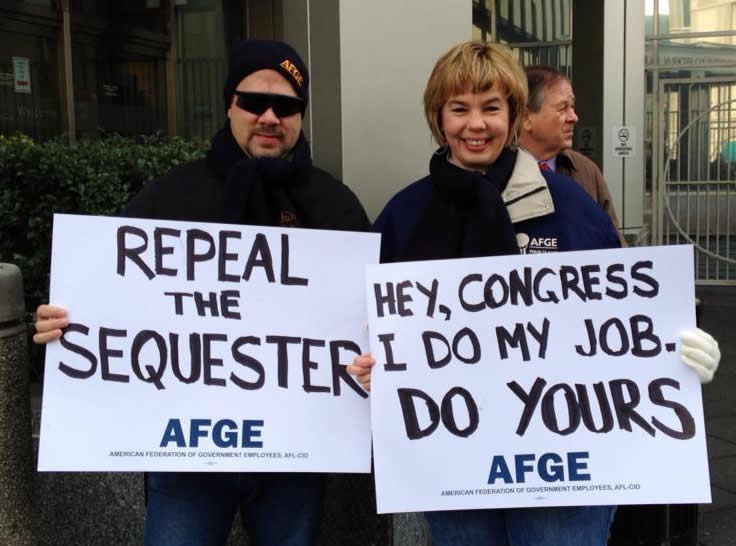

Share
Here we go again. With the federal government facing yet another politically inspired shutdown at midnight Sept. 30, the American Federation of Government Employees has had to mobilize yet again.
This time there’s an added threat, according to a recent news story: When the federal workers finally get called back they might – unlike in prior shutdowns that also weren’t their fault – not get paid for time they missed.
The federal government employs 2.15 million workers nationwide, with the Postal Service employing another 590,000. Almost all the federal employees would be declared “non-essential” and sent home if the government closes.
And it could: Congress has approved none of the money bills needed to keep the government and its services going in the new fiscal year, which starts Oct. 1. Its temporary money bill to fund federal agencies and programs, called a “continuing resolution,” is hung up over Tea Party insistence that lawmakers drop all money for implementing the Affordable Care Act, also known as “Obamacare.”
That’s led AFGE, the largest federal workers’ union, to mount a campaign to highlight the impact of the shutdown, and prevent it.
“A shutdown would be disastrous for America’s economic recovery, middle-class, and the livelihoods of our AFGE brothers and sisters, who are already hurting from the sequester, pay freeze, and furloughs,” the union said. “We need to demand that Congress ‘Stop the shutdown and stop the sequester.’” The sequester is the term given to Republican-mandated budget and spending cuts that began this past April.
“On top of the sequester there is now what I call a “Political Shutdown” of our government,” the union said in talking points sent to its members. “The American people aren’t shutting down the government. Government employees aren’t shutting down the government because we want to work. And the folks who need the services we provide don’t want a government shutdown.”
Individual AFGE unions and workers have been speaking out, too.
“Working families will be the collateral damage of this government shutdown battle,” said Gabrielle Martin, president of the union’s National Council of Locals at the Equal Employment Opportunity Commission.
“A government shutdown means no EEOC to enforce the Civil Rights Act and the other laws barring workplace discrimination. EEOC’s approximately 2,100 workers will be forced off the job without pay during a government shutdown. These same employees have already lost a week’s income in the past six months due to sequestration furloughs. Federal employees also are in the third year of a pay freeze.”
Civilian defense workers in Colorado Springs, Colo. – home to the U.S. Air Force Academy – confronted Rep. Doug Lamborn, R-Colo., about the shutdown. There are around 12,000 civilian defense workers in Colorado.
“We’re hoping Congress is going to come up to their senses and realize this standoff is going to have an impact in the Defense Department that will take decades to fix,” AFGE local leader Albert Rivera told the Colorado Springs Gazette after Lamborn’s local town hall meeting in August on the shutdown. Lamborn’s solution to avoiding the shutdown was to “cut entitlements,” the paper added.

